
Accreditation is the process in which certification of competency, authority, or credibility is presented. Testing and accreditation bodies provide the underlying assurance that organizations are adhering to internationally recognized standards. A local test laboratory contributes to the development of the national industry by providing inputs that enable projects validation and improvement.
Main Benefits
- Enhances user safety and protection of consumer rights.
- Increases national industry competitiveness.
- Contributes to knowledge exchange programs with universities and R&D centers.
- Insures that products commercialized or used meet the minimum quality requirements.


International Laboratory Accreditation Cooperation (ILAC)
www.ilac.org
ILAC is the international organisation for accreditation bodies operating in accordance with ISO/IEC 17011 and involved in the accreditation of conformity assessment bodies including calibration laboratories (using ISO/IEC 17025), testing laboratories (using ISO/IEC 17025), medical testing laboratories (using ISO 15189) and inspection bodies (using ISO/IEC 17020).
Accreditation is the independent evaluation of conformity assessment bodies against recognized standards to carry out specific activities to ensure their impartiality and competence. Through the application of national and international standards, government, procurers and consumers can have confidence in the calibration and test results, inspection reports and certifications provided.


Ducth Accreditation Council
www.rva.nl
RvA is the national accreditation body in the Netherlands. Our primary task consists of accrediting and renewing the accreditations of conformity-assessment bodies: laboratories, inspection bodies, certification bodies and verification bodies. This is to ensure that trust in the quality of products and services is genuinely justified.


European Committee for Standardization
www.cen.eu
CEN, the European Committee for Standardization, is an association that brings together the National Standardization Bodies of 34 European countries.
CEN is one of three European Standardization Organizations (together with CENELEC and ETSI) that have been officially recognized by the European Union and by the European Free Trade Association (EFTA) as being responsible for developing and defining voluntary standards at European level.
CEN provides a platform for the development of European Standards and other technical documents in relation to various kinds of products, materials, services and processes.
CEN supports standardization activities in relation to a wide range of fields and sectors including: air and space, chemicals, construction, consumer products, defense and security, energy, the environment, food and feed, health and safety, healthcare, ICT, machinery, materials, pressure equipment, services, smart living, transport and packaging.


Certification Europe
www.certificationeurope.com
Certification Europe founded in 1999 is an international accredited certification body based in Dublin with offices in London, Italy, Turkey and Japan. We work with organisations across the globe to achieve ISO Certification plus provide training on a variety of management systems from Quality Management, Health & Safety to Energy Management and Information Security.


Bureau Veritas
www.bureauveritas.com
Created in 1828, Bureau Veritas is a global leader in Testing, Inspection and Certification (TIC), delivering high quality services to help clients meet the growing challenges of quality, safety, environmental protection and social responsibility.


ACS Registrars
www.acsregistrars.com
Recognising that change is a constant feature of today’s commercial environment, ACS Registrars is committed to the concept of continuous improvement, working in tandem with clients to ensure on-going enhancement of systems and services. Regardless of a company’s size or location, ACS Registrars adheres to its policy of providing support at all times.